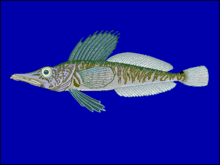Pagetopsis is a genus of marine ray-finned fish belonging to the family Channichthyidae, the crocodile icefishes. The species in this genus are found in the Southern Ocean.
| Pagetopsis | |
|---|---|

| |
| P. macropterus | |
| Scientific classification | |
| Domain: | Eukaryota |
| Kingdom: | Animalia |
| Phylum: | Chordata |
| Class: | Actinopterygii |
| Order: | Perciformes |
| Family: | Channichthyidae |
| Genus: | Pagetopsis Regan, 1913 |
| Type species | |
| Champsocephalus macropterus Boulenger, 1907
| |
Taxonomy
editPagetopsis was described as a genus in 1913 by the English ichthyologist Charles Tate Regan as a monotypic genus which had Champsocephalus macropterus, which had been described by the Belgian-born British ichthyologist George Albert Boulenger in 1907, as its only species.[1] The genus name is a combination of opsis with Pagetodes, the name given by John Richardson in 1843 to an icefish frozen on the bow of HMS Terror which had been eaten by a cat before it could be preserved, Regan said that Pagetodes could not be used until that fish was rediscovered.[2]
Species
editThere are currently two recognized species in this genus:[3]
- Pagetopsis macropterus (Boulenger, 1907)
- Pagetopsis maculata Barsukov & Permitin, 1958
Characteristics
editPagetopsis has a forward curving spine on the snout and a slightly protruding lower jaw. There are radiating ridge on the operculum ending in 3 or 4 spiny points, the other opercular bones lack spiny points. There are two lateral lines, neither having any bony plates, although the middle lateral line is restricted to the caudal peduncle. The pelvic fin is fan shaped with a well developed membrane while the first dorsal fin is large and tall and is contiguous with the second dorsal fin.[4] The largest species is P. macropterus which attains a maximum total length of 33 cm (13 in) while the maximum total length of P. maculata is 25 cm (9.8 in).[3]
Distribution and habitat
editPagetopsis Icefishes have a circumAntarctic distribution which extends as far north as the South Shetland Islands and the South Orkney Islands. They are deep water demersal fishes which are at depths down to 800 m (2,600 ft).[3]
References
edit- ^ Eschmeyer, William N.; Fricke, Ron & van der Laan, Richard (eds.). "Genera in the family Channichthyidae". Catalog of Fishes. California Academy of Sciences. Retrieved 26 October 2021.
- ^ Christopher Scharpf & Kenneth J. Lazara, eds. (12 April 2021). "Order Perciformes: Suborder Notothenoididei: Families Bovichtidae, Pseaudaphritidae, Elegopinidae, Nototheniidae, Harpagiferidae, Artedidraconidae, Bathydraconidae, Channichthyidae and Percophidae". The ETYFish Project Fish Name Etymology Database. Christopher Scharpf and Kenneth J. Lazara. Retrieved 26 October 2021.
- ^ a b c Froese, Rainer; Pauly, Daniel (eds.). "Species in genus Pagetopsis". FishBase. June 2021 version.
- ^ T. Iwami and K-H Koch (1990). "Channicthyidae Icefishes". In O. Gon and P.C. Heemstra (eds.). Fishes of the Southern Ocean. South African Institute for Aquatic Biodiversity. ISBN 9780868102115.